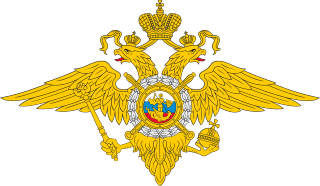Related Research Articles

The telecommunications in Russia has undergone significant changes since the 1980s, radio was a major new technology in the 1920s, when the Communists had recently come to power. Soviet authorities realized that the "ham" operator was highly individualistic and encouraged private initiative – too much so for the totalitarian regime. Criminal penalties were imposed but the working solution was to avoid broadcasting over the air. Instead radio programs were transmitted by copper wire, using a hub and spoke system, to loudspeakers in approved listening stations, such as the "Red" corner of a factory. This resulted in thousands of companies licensed to offer communication services today. Due to the enormous size of the country Russia today, the country leads in the number of TV broadcast stations and repeaters. The foundation for liberalization of broadcasting was laid by the decree signed by the President of the USSR in 1990. Telecommunication is mainly regulated through the Federal Law "On Communications" and the Federal Law "On Mass Media"

The Ministry of Internal Affairs of the Russian Federation is the interior ministry of Russia.

Pulkovo Airport is an international airport serving St. Petersburg, Russia. It consists of one terminal which is located 23 km (14 mi) south of the city centre. The airport serves as a hub for Rossiya Airlines and as focus city for Smartavia. It is responsible for serving the citizens of Saint Petersburg and the Leningrad Oblast: a total of 6,120,000 people. It is the 29th-busiest airport in Europe in 2022.

Yury Mikhailovich Luzhkov was a Russian politician who served as mayor of Moscow from 1992 to 2010. Before the election of Gavriil Popov as the first mayor of Moscow, he also headed the capital in 1990-1991 as chairman of the Mosgorispolkom. He was the vice-chairman and one of the founders of the ruling United Russia party. During Luzhkov's time, Moscow's economy expanded and he presided over large construction projects in the city, including the building of a new financial district. At the same time, he was accused of corruption, bulldozing historic buildings, and poor handling of traffic, as well as the city's smog crisis during the 2010 Russian wildfires. On 28 September 2010, Luzhkov was fired from his post by a decree issued by then-President Dmitry Medvedev.

Football Club Zenit, also known as Zenit Saint Petersburg or simply Zenit, is a Russian professional football club based in Saint Petersburg. Founded in 1925, the club plays in the Russian Premier League. Zenit are the reigning champions of the Russian Premier League. Previously they won the 2007, 2010, 2011–12, 2014–15, 2018–19, 2019–20, 2020–21, 2021–22 and the 2022–23 seasons of the Russian Premier League, as well as the 2007–08 UEFA Cup and the 2008 UEFA Super Cup. The club is owned and sponsored by the Russian state-owned energy giant Gazprom. The team plays its home matches at the Gazprom Arena. In March 2022, the club was expelled from all European and international club competitions by FIFA and the UEFA due to the Russian invasion of Ukraine. In addition, the European Club Association suspended the team. On 24 May 2023, Zenit became the first Russian sports club with 10 million followers on social media.
JSC "Donavia" was an Aeroflot subsidiary airline based in Rostov-on-Don, Russia. Its main bases were Rostov-on-Don Airport and Mineralnye Vody Airport after the Kavminvodyavia bankruptcy. It was known as Aeroflot-Don from 2000–2009. In the spring of 2016, its operations and aircraft were merged into sister company Rossiya.
Rossiya Airlines, sometimes branded as Rossiya—Russian Airlines, is one of the oldest and largest air carriers of Russia. It was founded on 7 May 1934. It is a part of Aeroflot Group. Rossiya is the largest and the base carrier of Pulkovo Airport.

Ves Peterburg (/vʲesʲ pʲɪtʲɪrˈburg/; in 1914–1923 Ves Petrograd; in 1924–1940 Ves Leningrad — the annual city directory of Petersburg–Petrograd–Leningrad started in 1894 by Aleksei Sergeevich Suvorin in Russian Empire, continued by his descendants up to 1917 and resumed in 1922 by Lensovet, the soviet city authorities of Leningrad, up to 1935.

Aleksei Sergeyevich Suvorin was a newspaper and book publisher and journalist whose publishing empire wielded considerable influence during the last decades of the Russian Empire.
Vsya Rossiya was the title of a series of directories of the Russian Empire published by Aleksei Sergeevich Suvorin on a yearly basis from 1895 to 1923 and was continued under the name Ves SSSR from 1924 to 1931. Each volume was anywhere between 500 and 1500 pages long. The directories contained detailed lists of government offices, public services and medium and large businesses present in major cities across the Russian Empire. These directories are often used by genealogists today to trace family members who were living in pre-revolutionary Russia and the early Soviet period when vital records are missing or prove difficult to find. Historians use them to research the social histories of late 19th century and early 20th century Russia.

St. Petersburg is a major trade gateway, financial and industrial center of Russia specialising in oil and gas trade, shipbuilding yards, aerospace industry, radio and electronics, software and computers; machine building, heavy machinery and transport, including tanks and other military equipment, mining, instrument manufacture, ferrous and nonferrous metallurgy, chemicals, pharmaceuticals, medical equipment, publishing and printing, food and catering, wholesale and retail, textile and apparel industries, and many other businesses.

Saint Petersburg, formerly known as Petrograd and later Leningrad, is the second-largest city in Russia after Moscow. It is situated on the River Neva, at the head of the Gulf of Finland on the Baltic Sea. The city had a population of 5,601,911 residents as of 2021, with more than 6.4 million people living in the metropolitan area. Saint Petersburg is the fourth-most populous city in Europe, the most populous city on the Baltic Sea, and the world's northernmost city of more than 1 million residents. As the former capital of Imperial Russia, and a historically strategic port, it is governed as a federal city.
Alexander Sergeevich Stolbov is a Soviet Russian painter and art teacher, living and working in Saint Petersburg. He is a member of the Saint Petersburg Union of Artists, regarded as one of representatives of the Leningrad school of painting, most known for his portraits.

Vladimir Ivanovich Seleznev was a Soviet Russian realist painter, lived and worked in Leningrad, member of the Leningrad branch of Union of Artists of Russian Federation, regarded by art historian Sergei V. Ivanov as a representative of the Leningrad school of painting, most famous for his genre paintings and portraits.

Valery Vladimirovich Vatenin was a Russian Soviet realist painter, graphic artist, and art teacher, who lived and worked in Leningrad. He was a member of the Leningrad branch of Union of Artists of Russian Federation, and regarded as one of the brightest representatives of the "left wing" of the Leningrad school of painting.

Moscow State Pedagogical University or Moscow State University of Education is an educational and scientific institution in Moscow, Russia, with eighteen faculties and seven branches operational in other Russian cities. The institution had undergone a series of name changes since its establishment in 1872.
The year 1922 was marked by many events that left an imprint on the history of Soviet and Russian Fine Arts.
The year 1923 was marked by many events that left an imprint on the history of Soviet and Russian Fine Arts.

Homelessness in Russia has been observed since the end of the 19th century. After the abolition of serfdom, major cities experienced a large influx of former serfs who sought jobs as industrial workers in the rapidly developing Russian industry. These people often lived in harsh conditions, sometimes renting a room, shared between several families. There were also many homeless people.
References
- ↑ "Anniversary of Aleksey Suvorin, Russian journalist, publisher, theater critic and playwright". Presidential Library. Retrieved 2024-11-04.
- ↑ Aleksey Suvorin. All Russia (Вся Россия) and All USSR (Весь СССР) Directories.